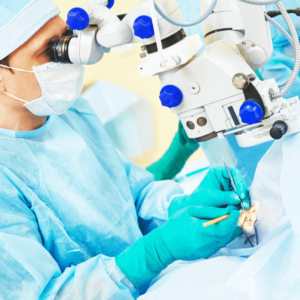Post-cataract surgery refers to the time after a person has had cataract surgery. Cataract surgery is a procedure to remove the cloudy lens from the eye and replace it with an artificial lens to improve vision.
What You Need to Know Before Post-Cataract Surgery
If you are considering post-cataract surgery, here are some essential things to keep in mind:
- Pre-operative evaluation: If cataract surgery is appropriate for you, your ophthalmologist will perform a detailed eye exam to assess the size and shape of your eye, examine the thickness of your cornea, and evaluate the health of your retina. This examination helps to make sure that you are a suitable candidate for cataract surgery.
- Type of anesthesia: Cataract surgery is usually performed under local anesthesia, meaning you will be awake during the procedure, but your eye will be numbed. In some cases, you may be given sedation to help you relax.
- The procedure: Cataract surgery is a simple, outpatient procedure that involves removing the cloudy natural lens of your eye and replacing it with an artificial one. The process typically takes 30 minutes and an hour to complete, depending on the individual situation.
- Post-operative care: After the procedure, it’s essential to follow your eye doctor’s instructions for post-operative care, which may include using eye drops, avoiding certain activities, and wearing protective eyewear.
- Potential complications: Cataract surgery is a relatively safe procedure with few complications. However, it is essential to note that risks are involved, including infection, bleeding, and lens dislocation. Should any of these occur, they can be treated effectively.
- Recovery time: Most people experience some improvement in vision within a day or two after cataract surgery, but it can take several weeks for your vision to recover fully. During this time, you may experience mild discomfort, blurry vision, and sensitivity to light.
- Cost: The cost of the surgery varies, depending on factors such as the type of artificial lens used, your insurance coverage, and where the procedure is performed.
It’s essential to have an open and honest conversation with your eye doctor about the risks and benefits of cataract surgery and to carefully consider your options before making a decision.
What Are the Most Common Problems After Cataract Surgery
Cataract surgery is a common and typically safe procedure for removing the cloudy lens in your eye and replacing it with a clear artificial lens. However, as with any surgical procedure, risks are involved, and it’s essential to understand them before surgery. Here are some of the most common risks associated with post-cataract surgery:
- Infection: The risk of infection is low, but if it does occur, it can cause redness, swelling, and discharge in your eye. Antibiotic eye drops can help prevent infection.
- Bleeding: In rare cases, bleeding can occur during or after the procedure. This can cause decreased vision or the need for additional surgery.
- Lens dislocation: The artificial lens used in cataract surgery can become dislocated from its proper position, leading to vision problems.
- Posterior capsule opacity: This is a condition where the back of the lens capsule becomes cloudy, affecting your vision. This can be treated with a laser procedure.
- Dry eyes: Some people experience dry eyes after cataract surgery, which can cause discomfort and sensitivity to light. This can usually be treated with artificial tear drops.
- Glare and halos: After surgery, some people may experience glare and halos around lights, especially at night. This is a common side effect that usually improves over time.
- Retinal detachment: In rare cases, the retina can become detached after cataract surgery, leading to vision loss.
Discussing these risks with your eye doctor before undergoing cataract surgery is essential to make an informed decision about whether the procedure is right for you. Your eye doctor can also provide more information on how to minimize the risks of post-cataract surgery.
Tips for Taking Care of Yourself After Post-Cataract Surgery
After cataract surgery, taking good care of yourself is essential to ensure a smooth recovery and reasonable outcome. Here are some tips for taking care of yourself after the procedure:
- Follow your eye doctor’s instructions: Your eye doctor will give you specific instructions for post-operative care, including how to use eye drops, when to avoid certain activities, and when to return for follow-up visits. It’s essential to follow these instructions carefully.
- Protect your eye: Your eye doctor may advise you to wear protective eyewear, such as sunglasses, for some time after the surgery. This can help prevent injury and reduce the risk of infection.
- Use eye drops as directed: After the operation, you will be prescribed eye drops to help heal and prevent infection. To ensure the best possible outcome, you must follow your doctor’s instructions regarding using the eye drops and finish the entire course of treatment, even if your eye feels better.
- Avoid strenuous activities: Your eye doctor may advise you to avoid strenuous activities, such as heavy lifting, for some time after the surgery. This can help reduce the risk of complications and allow your eye to heal correctly.
- Keep your follow-up appointments: It’s essential to keep your appointments with your eye doctor after the surgery, so they can monitor your progress and check for any complications.
- Practice good hygiene: it’s essential to practice good hygiene, such as regularly washing hands and avoiding touching your eye area to reduce the risk of infection.
- Get plenty of rest: Getting plenty of rest after the surgery can help speed up your recovery and reduce discomfort.
- Avoid smoking: For successful cataract surgery, it is crucial to stop smoking in the weeks following the operation. By quitting smoking before the procedure, you can reduce the risk of complications and ensure your surgery goes as smoothly as possible.
Following these tips and closely following your eye doctor’s instructions can help ensure a smooth recovery and good outcome after post-cataract surgery.
10 Things to Avoid After Post-Cataract Surgery
Avoiding certain activities and habits that could put unnecessary stress on your eye is essential To ensure a smooth and successful recovery after cataract surgery.
Here are 10 things to avoid after post-cataract surgery:
- Rubbing or pressing on your eye: Rubbing or pressing on your eye can cause the artificial lens to shift or become dislodged, leading to complications.
- Swimming or using a hot tub: Immersing your eye in water can increase the risk of infection, so it’s best to avoid swimming or using a hot tub for some time after the surgery.
- Strenuous activities: Avoid engaging in activities that could cause you to sweat or put a lot of strain on your eye, such as heavy lifting, running, or playing contact sports.
- Touching your eye: Touching your eye with dirty hands can increase the risk of infection, so it’s essential to practice good hygiene and avoid touching your eye.
- Makeup or eyeliner: Avoid wearing makeup or eyeliner for some time after the surgery, as this can increase the risk of infection.
- Alcohol and certain medications: Alcohol and certain medications, such as aspirin, can increase the risk of bleeding after the surgery, so it’s essential to avoid these for some time after the procedure.
- Staring at screens for long periods: Staring at screens, such as computer screens, televisions, and smartphones, for long periods can cause eye strain and discomfort. Take breaks and use an anti-glare screen to reduce the strain on your eye.
- Exposing your eye to smoke or dust: Exposure to smoke or dust can irritate your eye and increase the risk of infection, so it’s essential to avoid these as much as possible.
- Taking hot showers or saunas: Hot showers or saunas can cause your eye to become red and swollen, so it’s best to avoid these for some time after the surgery.
- Driving in the dark: Glare and halos around lights, especially at night, are common after cataract surgery. It’s best to avoid driving in the dark until your vision has fully recovered.
Avoiding these activities and habits can help ensure a smooth and successful recovery after cataract surgery and minimize the risk of complications.
How Many Days of Rest are Needed After Cataract Surgery?
The amount of rest required after cataract surgery can vary depending on the individual and the procedure performed. Most people can generally return to their normal activities within a few days of the surgery.
Immediately after the procedure, you may experience light sensitivity, blurred vision, redness, and swelling. These symptoms are normal and usually resolve within a few days. Your eye doctor may advise you to take it easy for the first 24 to 48 hours after the surgery and avoid strenuous activities.
You should also avoid touching or rubbing your eye, using makeup or eyeliner, swimming, and taking hot showers or saunas. Your eye doctor may also advise you to wear protective eyewear, such as sunglasses, to protect your eye from the sun and wind.
Most people can return to work and resume normal activities within a few days of the surgery. Still, it’s essential to listen to your body and avoid activities that cause discomfort or strain your eye. Your eye doctor will provide specific instructions for post-operative care and when to return for follow-up visits, so follow their instructions carefully.
Conclusion
Cataract surgery is a safe and effective procedure that can help restore vision in people with cataracts. However, like any surgery, some potential risks and complications can occur after the procedure.
Some of the most common problems after cataract surgery include infection, swelling, bleeding, pain, dry eye, glare and halos, posterior capsular opacification, lens displacement, and retinal detachment.
It’s essential to listen to your body and follow your eye doctor’s instructions for post-operative care, including avoiding activities that cause discomfort or strain your eye.
If you experience any symptoms or problems after cataract surgery, it’s essential to contact your eye doctor as soon as possible. With prompt treatment, most complications can be resolved, and your vision can be restored.






